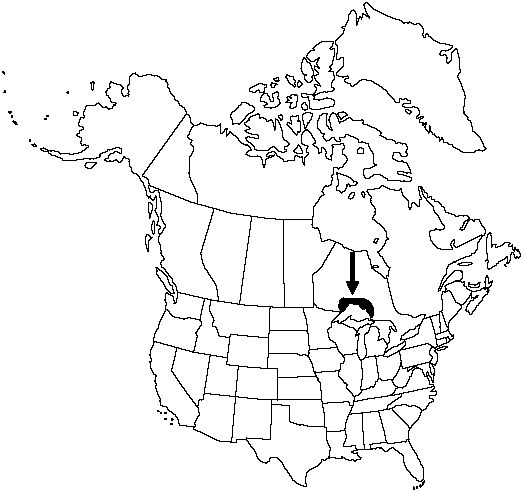Difference between revisions of "Botrychium pseudopinnatum"
Contr. Univ. Michigan Herb. 17: 322. 1990.
FNA>Volume Importer |
FNA>Volume Importer |
||
| Line 17: | Line 17: | ||
}}<!-- | }}<!-- | ||
| − | --><span class="statement" id="st- | + | --><span class="statement" id="st-undefined" data-properties=""><b>Trophophore </b>stalk 0–3 mm, 0 to 0.2 times length of trophophore rachis; blade dark green, somewhat shiny, oblong, 1–2-pinnate, to 4.5 × 2.5 cm, leathery. <b>Pinnae</b> to 6 pairs, ascending, approximate to overlapping, distance between 1st and 2d pinnae not or slightly more than between 2d and 3d pairs, basal pinna pair approximately equal in size and cutting to adjacent pair, obliquely ovate to lanceolate-oblong to spatulate, deeply and regularly lobed or pinnulate, lobed to tip, margins entire to very shallowly crenulate, apex truncate, venation pinnate. <b>Sporophores</b> 2-pinnate, 1–2 times length of trophophore. <b>2n</b> =270.</span><!-- |
-->{{Treatment/Body | -->{{Treatment/Body | ||
| + | |phenology=Leaves appearing in late spring to early fall. | ||
|habitat=Sandy soil | |habitat=Sandy soil | ||
|elevation=300–500 m | |elevation=300–500 m | ||
| Line 40: | Line 41: | ||
|basionyms= | |basionyms= | ||
|family=Ophioglossaceae | |family=Ophioglossaceae | ||
| + | |phenology=Leaves appearing in late spring to early fall. | ||
|habitat=Sandy soil | |habitat=Sandy soil | ||
|elevation=300–500 m | |elevation=300–500 m | ||
| Line 47: | Line 49: | ||
|publication year=1990 | |publication year=1990 | ||
|special status= | |special status= | ||
| − | |source xml=https://jpend@bitbucket.org/aafc-mbb/fna- | + | |source xml=https://jpend@bitbucket.org/aafc-mbb/fna-data-curation.git/src/9216fc802291cd3df363fd52122300479582ede7/coarse_grained_fna_xml/V2/V2_617.xml |
|genus=Botrychium | |genus=Botrychium | ||
|subgenus=Botrychium subg. Botrychium | |subgenus=Botrychium subg. Botrychium | ||
|species=Botrychium pseudopinnatum | |species=Botrychium pseudopinnatum | ||
| − | |||
| − | |||
| − | |||
| − | |||
| − | |||
| − | |||
| − | |||
| − | |||
| − | |||
| − | |||
| − | |||
| − | |||
| − | |||
| − | |||
| − | |||
| − | |||
| − | |||
| − | |||
| − | |||
| − | |||
}}<!-- | }}<!-- | ||
-->[[Category:Treatment]][[Category:Botrychium subg. Botrychium]] | -->[[Category:Treatment]][[Category:Botrychium subg. Botrychium]] | ||
Revision as of 13:24, 27 July 2019
Trophophore stalk 0–3 mm, 0 to 0.2 times length of trophophore rachis; blade dark green, somewhat shiny, oblong, 1–2-pinnate, to 4.5 × 2.5 cm, leathery. Pinnae to 6 pairs, ascending, approximate to overlapping, distance between 1st and 2d pinnae not or slightly more than between 2d and 3d pairs, basal pinna pair approximately equal in size and cutting to adjacent pair, obliquely ovate to lanceolate-oblong to spatulate, deeply and regularly lobed or pinnulate, lobed to tip, margins entire to very shallowly crenulate, apex truncate, venation pinnate. Sporophores 2-pinnate, 1–2 times length of trophophore. 2n =270.
Phenology: Leaves appearing in late spring to early fall.
Habitat: Sandy soil
Elevation: 300–500 m
Discussion
Botrychium pseudopinnatum is the only known hexaploid in Botrychium subg. Botrychium. It differs from B. pinnatum in smaller size, in narrower trophophore with relatively shorter and more oblique and ascending pinnae, in longer trophophore stalk, and in blade color, texture, and luster.
Of conservation concern.
Selected References
None.
